可用虚拟语气的用法总结
虚拟语气用法归纳
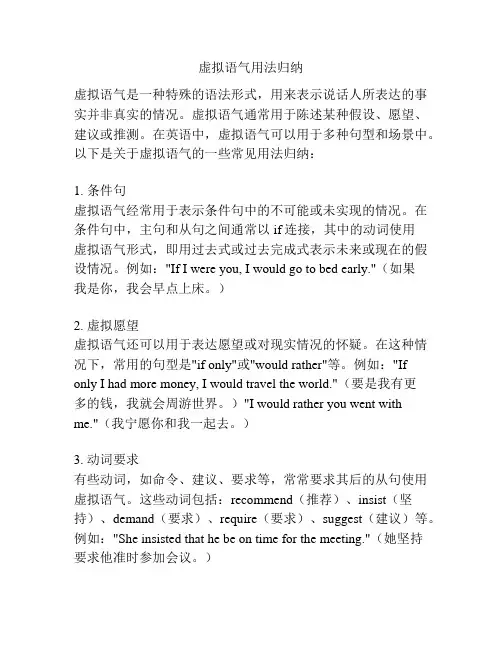
虚拟语气用法归纳虚拟语气是一种特殊的语法形式,用来表示说话人所表达的事实并非真实的情况。
虚拟语气通常用于陈述某种假设、愿望、建议或推测。
在英语中,虚拟语气可以用于多种句型和场景中。
以下是关于虚拟语气的一些常见用法归纳:1. 条件句虚拟语气经常用于表示条件句中的不可能或未实现的情况。
在条件句中,主句和从句之间通常以if连接,其中的动词使用虚拟语气形式,即用过去式或过去完成式表示未来或现在的假设情况。
例如:"If I were you, I would go to bed early."(如果我是你,我会早点上床。
)2. 虚拟愿望虚拟语气还可以用于表达愿望或对现实情况的怀疑。
在这种情况下,常用的句型是"if only"或"would rather"等。
例如:"Ifonly I had more money, I would travel the world."(要是我有更多的钱,我就会周游世界。
)"I would rather you went with me."(我宁愿你和我一起去。
)3. 动词要求有些动词,如命令、建议、要求等,常常要求其后的从句使用虚拟语气。
这些动词包括:recommend(推荐)、insist(坚持)、demand(要求)、require(要求)、suggest(建议)等。
例如:"She insisted that he be on time for the meeting."(她坚持要求他准时参加会议。
)4. 形容词和名词后接从句有时,形容词或名词后接从句时,从句中的谓语动词要使用虚拟语气。
这种情况通常表示说话人对从句所表达的内容的怀疑或不同意。
例如:"It is important that he study hard for the exam."(他认真备考这个考试很重要。
(完整版)英语虚拟语气语法归纳总结
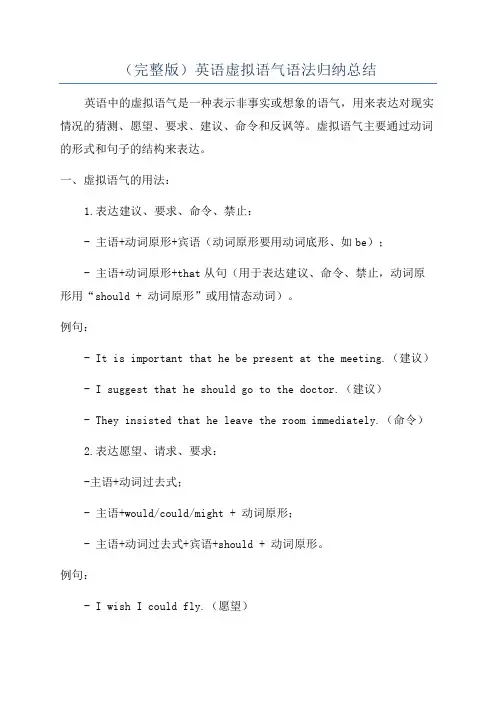
(完整版)英语虚拟语气语法归纳总结英语中的虚拟语气是一种表示非事实或想象的语气,用来表达对现实情况的猜测、愿望、要求、建议、命令和反讽等。
虚拟语气主要通过动词的形式和句子的结构来表达。
一、虚拟语气的用法:1.表达建议、要求、命令、禁止:- 主语+动词原形+宾语(动词原形要用动词底形、如be);- 主语+动词原形+that从句(用于表达建议、命令、禁止,动词原形用“should + 动词原形”或用情态动词)。
例句:- It is important that he be present at the meeting.(建议)- I suggest that he should go to the doctor.(建议)- They insisted that he leave the room immediately.(命令)2.表达愿望、请求、要求:-主语+动词过去式;- 主语+would/could/might + 动词原形;- 主语+动词过去式+宾语+should + 动词原形。
例句:- I wish I could fly.(愿望)- I would appreciate it if you could help me.(请求)3.表示虚拟条件:- If条件从句中的谓语动词用过去完成时,主句用would/should/might/could + have + 过去分词;- If条件从句中的谓语动词用过去时,主句用would/should/could + 动词原形。
例句:- If I had known his phone number, I would have called him.(虚拟条件)- If you had listened to me, we could have finished the project earlier.(虚拟条件)4.表达建议、要求、祝愿:- If only内部称述 + 主语 + 过去式。
虚拟语气的用法归纳
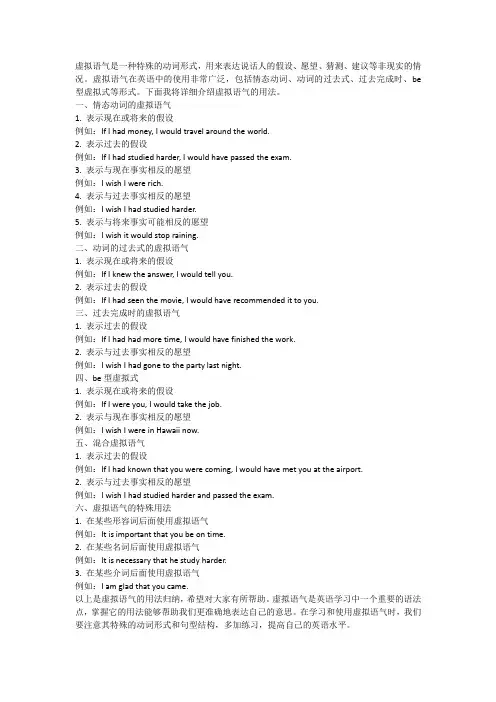
虚拟语气是一种特殊的动词形式,用来表达说话人的假设、愿望、猜测、建议等非现实的情况。
虚拟语气在英语中的使用非常广泛,包括情态动词、动词的过去式、过去完成时、be 型虚拟式等形式。
下面我将详细介绍虚拟语气的用法。
一、情态动词的虚拟语气1. 表示现在或将来的假设例如:If I had money, I would travel around the world.2. 表示过去的假设例如:If I had studied harder, I would have passed the exam.3. 表示与现在事实相反的愿望例如:I wish I were rich.4. 表示与过去事实相反的愿望例如:I wish I had studied harder.5. 表示与将来事实可能相反的愿望例如:I wish it would stop raining.二、动词的过去式的虚拟语气1. 表示现在或将来的假设例如:If I knew the answer, I would tell you.2. 表示过去的假设例如:If I had seen the movie, I would have recommended it to you.三、过去完成时的虚拟语气1. 表示过去的假设例如:If I had had more time, I would have finished the work.2. 表示与过去事实相反的愿望例如:I wish I had gone to the party last night.四、be型虚拟式1. 表示现在或将来的假设例如:If I were you, I would take the job.2. 表示与现在事实相反的愿望例如:I wish I were in Hawaii now.五、混合虚拟语气1. 表示过去的假设例如:If I had known that you were coming, I would have met you at the airport.2. 表示与过去事实相反的愿望例如:I wish I had studied harder and passed the exam.六、虚拟语气的特殊用法1. 在某些形容词后面使用虚拟语气例如:It is important that you be on time.2. 在某些名词后面使用虚拟语气例如:It is necessary that he study harder.3. 在某些介词后面使用虚拟语气例如:I am glad that you came.以上是虚拟语气的用法归纳,希望对大家有所帮助。
虚拟语气用法总结(超好)
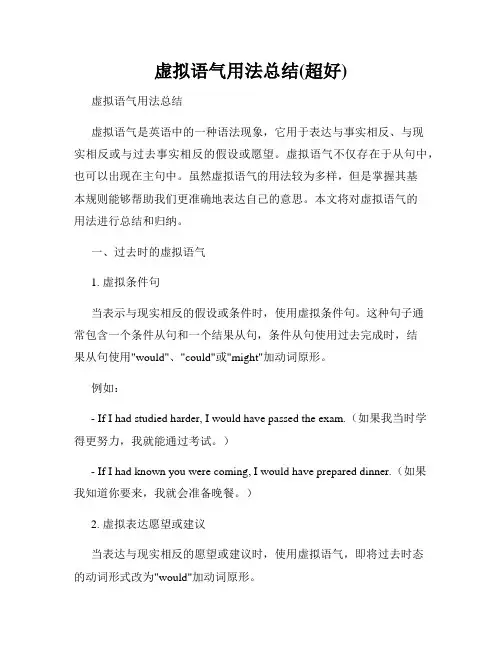
虚拟语气用法总结(超好)虚拟语气用法总结虚拟语气是英语中的一种语法现象,它用于表达与事实相反、与现实相反或与过去事实相反的假设或愿望。
虚拟语气不仅存在于从句中,也可以出现在主句中。
虽然虚拟语气的用法较为多样,但是掌握其基本规则能够帮助我们更准确地表达自己的意思。
本文将对虚拟语气的用法进行总结和归纳。
一、过去时的虚拟语气1. 虚拟条件句当表示与现实相反的假设或条件时,使用虚拟条件句。
这种句子通常包含一个条件从句和一个结果从句,条件从句使用过去完成时,结果从句使用"would"、"could"或"might"加动词原形。
例如:- If I had studied harder, I would have passed the exam.(如果我当时学得更努力,我就能通过考试。
)- If I had known you were coming, I would have prepared dinner.(如果我知道你要来,我就会准备晚餐。
)2. 虚拟表达愿望或建议当表达与现实相反的愿望或建议时,使用虚拟语气,即将过去时态的动词形式改为"would"加动词原形。
例如:- I wish I were taller.(我希望我更高。
)- She suggested that he take a bus.(她建议他坐公交车。
)二、现在时的虚拟语气1. 虚拟条件句与过去时的虚拟条件句类似,现在时的虚拟条件句也包含一个条件从句和一个结果从句。
条件从句使用"were to"结构或"should"加动词原形,结果从句使用"would"、"could"或"might"加动词原形。
例如:- If I were to win the lottery, I would travel the world.(如果我中了彩票,我会周游世界。
虚拟语气的用法总结
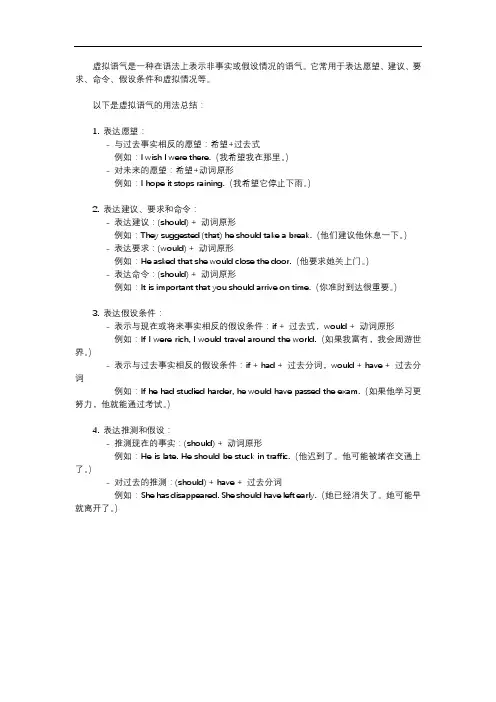
虚拟语气是一种在语法上表示非事实或假设情况的语气。
它常用于表达愿望、建议、要求、命令、假设条件和虚拟情况等。
以下是虚拟语气的用法总结:1. 表达愿望:- 与过去事实相反的愿望:希望+过去式例如:I wish I were there.(我希望我在那里。
)- 对未来的愿望:希望+动词原形例如:I hope it stops raining.(我希望它停止下雨。
)2. 表达建议、要求和命令:- 表达建议:(should) + 动词原形例如:They suggested (that) he should take a break.(他们建议他休息一下。
)- 表达要求:(would) + 动词原形例如:He asked that she would close the door.(他要求她关上门。
)- 表达命令:(should) + 动词原形例如:It is important that you should arrive on time.(你准时到达很重要。
)3. 表达假设条件:- 表示与现在或将来事实相反的假设条件:if + 过去式,would + 动词原形例如:If I were rich, I would travel around the world.(如果我富有,我会周游世界。
)- 表示与过去事实相反的假设条件:if + had + 过去分词,would + have + 过去分词例如:If he had studied harder, he would have passed the exam.(如果他学习更努力,他就能通过考试。
)4. 表达推测和假设:- 推测现在的事实:(should) + 动词原形例如:He is late. He should be stuck in traffic.(他迟到了。
他可能被堵在交通上了。
)- 对过去的推测:(should) + have + 过去分词例如:She has disappeared. She should have left early.(她已经消失了。
虚拟语气的用法总结
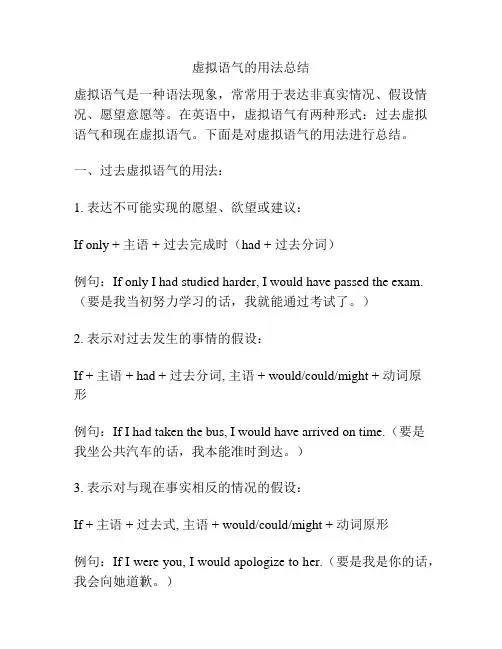
虚拟语气的用法总结虚拟语气是一种语法现象,常常用于表达非真实情况、假设情况、愿望意愿等。
在英语中,虚拟语气有两种形式:过去虚拟语气和现在虚拟语气。
下面是对虚拟语气的用法进行总结。
一、过去虚拟语气的用法:1. 表达不可能实现的愿望、欲望或建议:If only + 主语 + 过去完成时(had + 过去分词)例句:If only I had studied harder, I would have passed the exam.(要是我当初努力学习的话,我就能通过考试了。
)2. 表示对过去发生的事情的假设:If + 主语 + had + 过去分词, 主语 + would/could/might + 动词原形例句:If I had taken the bus, I would have arrived on time.(要是我坐公共汽车的话,我本能准时到达。
)3. 表示对与现在事实相反的情况的假设:If + 主语 + 过去式, 主语 + would/could/might + 动词原形例句:If I were you, I would apologize to her.(要是我是你的话,我会向她道歉。
)4. 表达对不可能实现的条件:If only + 过去式例句:If only I had a million dollars.(要是我有一百万美元该多好。
)二、现在虚拟语气的用法:1. 表达建议、命令等正式用法:表达建议:(should +动词原形/动词原形)例句:It's important (that) you should take some rest.(你应该休息一下,这很重要。
)表达命令:(应用“命令式”的虚拟形式)例句:It's vital (that) he be here on time.(他必须准时到达,这很重要。
)2. 表达愿望、要求、建议等陈述式的用法:It's time/It's high time + 过去式例句:It's time you went to bed.(你该去睡觉了,时间到了。
最全虚拟语气用法总结-202X年学习资料
千里之行,始于足下。
最全虚拟语气用法总结-202X年学习资料
虚拟语气是表示假设、愿望、建议、命令等非事实的情况的一种语气形式。
下面是对虚拟语气用法的总结:
1.表示假设:
- 表示与现在事实相反的假设:
- 与过去事实相反:If + 过去完成时,主句使用 would/could/might + have + 过去分词。
- 与现在事实相反:If + 过去时,主句使用 would/could/might + 动
词原形。
- 与将来事实相反:If + 过去时,主句使用 would/could/might + 动
词原形。
- 表示将来事实的虚拟:
- If + 一般现在时,主句使用 will/would/may/might/can/could + 动词原形。
2.表示愿望、建议和要求:
- 愿望:
- I wish + (that) + 从句(过去时)。
- If only + 从句(过去时)。
- 建议和要求:
- 动词原形 + that + 主语 + (should) + 动词原形。
第1页/共2页
锲而不舍,金石可镂。
3.表示命令和建议:
- 命令:
- 动词原形 + that + 主语 + 动词原形。
- 建议:
- It is (high) time + 过去式 + (that) + 主语 + 过去式。
以上是对虚拟语气用法的简要总结。
在实际运用中,需要根据具体情况选择适当的虚拟语气形式来表达所需的意思。
虚拟语气用法汇总
虚拟语气用法汇总一、虚拟语气在条件句中eg: If I had time, I would attend the meeting.If he had hurried, he could have caught the train.If I were to go abroad, I would go to America.注意:虚拟语气中的省略在条件句中,可省略if,把were ,had, should 提到句首,变为倒装句式.If I were at school again, I would study harder.Were I at school again, I would study harder.If you had come earlier, you would have met him.Had you come earlier, you would have met him.If it should rain tomorrow, we would not go climbing.Should it rain tomorrow, we would not go climbing.二、虚拟语气在名词从句中的运用(1)用于宾语从句1、用于wish后面的宾语从句中。
一般用虚拟语气,表示一种不可能实现的愿望。
其谓语动词形式为:表现在→过去时表过去→过去完成时表将来→would, might, could+动词原形I wish (that) I were a bird.I wish (that) I had seen the film last night.I wish (that) I would/could go.2、用于表示命令、建议、要求等一类词后面的宾语从句中谓语动词用:(should)+ 动词原形。
insist, order, command, suggest, advise, propose, require, request, demand, desire etc. We suggested that the meeting (should) be put off.They insisted that the boy (should) go with them.注意:suggest 当表示“暗示、表明“讲时,insist 表示“坚持认为”之意时,应用陈述语气。
虚拟语气用法总结(完整)
虚拟语气用法总结(完整)if+主语+had+过去分词+其他+主语+should/would/could/might+have+过去分词+其他例:1.XXX,XXX如果我知道你要来,我就会准备些食物的。
(事实:我不知道)2.XXX,XXX.如果我当时研究更努力些,我就能通过考试了。
(事实:我没有用功研究)3、表示与将来事实相反的情况:if+主语+were/should+动词原形+其他+主语+would/could/might+动词原形+其他例:1.IfIwereyou,XXX.如果我是你,我不会那样做。
(将来:我不可能成为你)2.XXX,XXX.如果下雨了,带上这把伞。
(将来:不一定会下雨)1.If I had arrived earlier。
I would have been able to meet her。
(Fact: I arrived late)2.If he had XXX my advice。
he would not have made such a mistake。
(Fact: He didn't listen to me)3.If he were to come here tomorrow。
I would talk to him。
(Fact: It's XXX he will come)In expressing ns。
orders。
requests。
etc。
the subjunctive mood is often used in the object clause。
with the verb in the form of "should + infinitive," which can be omitted.Other uses of XXX:1.The subjunctive mood is used in the object clause after "wish" to express a XXX fact。
虚拟语气用法归纳
虚拟语气用法归纳虚拟语气是指说话者虚构的一种语言形式,用来表达说话者对现实情况的假设、猜测、愿望或条件。
虚拟语气在中文中的使用非常广泛,涉及到多种语法结构和情境。
以下是对虚拟语气用法的归纳总结。
一、表示假设的虚拟语气1. 假设条件句假设条件句是虚拟语气的常见表现形式,通过“如果……就”“要是……就”等句式来表示假设情况。
例如:“如果我有钱的话,我就去旅行。
”“要是我能回到过去,我就不会犯同样的错误了。
”在这种情况下,虚拟语气表达了说话者对假设情况的想象或假设。
2. 表示对过去情况的虚拟对于已经发生的事情,我们常常需要使用虚拟语气来表示对过去情况的假设、愿望或遗憾。
例如:“要是我当初早点知道你的困难,我会帮助你的。
”“要是我早知道这本书这么好,我早就买了。
”在这些句子中,虚拟语气用来表达对过去情况的假设和遗憾的感受。
3. 表示不太可能实现的愿望虚拟语气也在表达愿望时发挥重要作用。
例如:“但愿我能成为一名科学家!”“但愿我们之间不曾发生过误会。
”这种虚拟语气则表达了对不太可能实现的愿望或希望的渴求。
二、表示建议、命令、要求的虚拟语气1. 否定句中的建议在否定句中,我们常常使用虚拟语气来表示建议或劝告。
例如:“你不如早点休息吧。
”“他不妨多读点书。
”这些句子表示一种建议或劝告,通过虚拟语气传达说话者对于被建议者的主观想法。
2. 表示礼貌的虚拟语气在书信、邀请和请求的语境中,虚拟语气被用来表示礼貌和尊重。
例如:“如果您有空,不妨来我家做客。
”“请求您尽快给予答复。
”这些句子中的虚拟语气传达了说话者的礼貌和尊重心态。
三、表示假设、推测的虚拟语气1. 表示假设的虚拟语气有时候,虚拟语气也可以用来表示对可能的假设或推测。
例如:“他说这话,可能是有所图。
”“今天天气这么糟,可能是要下雨了。
”在这些句子中,虚拟语气表达了说话者对可能的假设或推测。
2. 表示希望的虚拟语气虚拟语气也可以用来表示对未来情况的希望或愿望。
- 1、下载文档前请自行甄别文档内容的完整性,平台不提供额外的编辑、内容补充、找答案等附加服务。
- 2、"仅部分预览"的文档,不可在线预览部分如存在完整性等问题,可反馈申请退款(可完整预览的文档不适用该条件!)。
- 3、如文档侵犯您的权益,请联系客服反馈,我们会尽快为您处理(人工客服工作时间:9:00-18:30)。
虚拟语气的用法总结语气:语气是动词的一中形式,它表示说话人对某一行为或事情的看法和态度。
虚拟语气表示动作或状态不是客观存在的事实,而是说话人的主观愿望,假设或推测等。
如If I were you, I should study English.一.虚拟语气在条件从句的用法条件句有两类,一类是真实条件句;一类是非真实条件句,也就是虚拟条件句。
如果假设的情况是有可能发生的,就是真实条件句,谓语要用陈述语气。
如If it doesn’t rain tomorrow, we will go to the park.如果假设的情况是过去或现在都不存在的,或将来不大可能发生的,则是虚拟条件句。
如If he had seen you yesterday, he would have asked you about it. 在含有虚拟条件句的复合句中,主句If her mother had taken the doctor’s advice, she would/might have got well earlier.If it were to rain tomorrow, the match would be canceled.有时候省略if,采用局部倒装语序。
把had /should/were 等动词(不包括行为动词)移到从句的句首。
例如:Were it to rain tomorrow, our picnic would be canceled.Had it not been for the storm, we would have arrived in time.Should the earth stop running, what would happen?二. 错综时间条件句有时条件从句的动作和主句动作发生的时间不一致,这时需要根据意思采用表示不同时间的动词形式来进行调整。
If she had taken the doctor’s advice, she might still be alive.If I were you, I would have accepted their terms.三.含蓄条件句1.有时候假设的情况并不用条件从句表示出来,而是通过介词短语来表示。
如Without air(If there were no air), there would be no living things.But for your help (If it hadn’t been for your help), I couldn’t have done it.2. 假设的条件通过上下文表现出来。
I would go abroad for further study but that I am poor.I was ill that day. Otherwise I would have taken part in the party.3. 表示虚拟语气的主句或从句有时可以省略,但其含义仍可以推知。
(1)省去条件从句You could have washed your clothes yourself. (你本可以自己洗衣服的。
)省去了If you had wanted to。
(事实是:你自己没洗衣服,因为你不想洗。
)(2)省去主句(常用以表示愿望)If my grandmother were with me! (如果我的祖母和我在一起多好啊!)事实是:祖母已不在世。
四、虚拟语气在名词性从句中的应用①“wish+宾语从句”表示不可能实现的愿望,汉语可译为“可惜……、悔不该……、但愿……”。
表示现在不能实现的愿望,从句的谓语动词用过去式;表示将来不可能实现的愿望用“would/could+动词原形”;表示过去不可能实现的愿望时用“had+过去分词”。
如:I wish I were better-looking. 要是我长得再漂亮些就好了。
I wish I had met the film star just now. 我要是刚才遇到那位电影明星该多好啊!I wish I would be a solider. 我想当一名军人。
【考例】How I wish every family ____ a large house with a beautiful garden! (上海2002春)A. hasB. hadC. will haveD. had had②在表示建议、要求、愿望、命令、坚持、想法(advise, command, demand, decide, desire, insist, order, prefer, propose, request, require, suggest)等动词后面的宾语从句,或这些动词的同源名词后面所跟的同位语从句或表语从句中,从句谓语用“should+动词原形”,其中在美国英语中,should常省略。
如:The young man insisted that I (should) go with his fellows. 这个年轻人坚持要我同他的同伴们一起去。
The doctor advised that he change his job. 医生建议他换工作。
【考例】Teachers recommend parents_______ their children under 12 to ride bicycles to school for safety. (福建2010)A. not allowB. do not allowC. mustn’t allowD. couldn’t allow③在would rather后的宾语从句中,谓语常常用过去时来表示现在或将来的情况,用过去完成时表示过去的情况。
如:— Shall I open the window? 我可以把窗户打开吗?—I’d rather you didn’t. 我觉得还是不要。
【考例】George is going to talk about the geography of his country, but I’d rather he _______ more on its culture. (江苏2010)A. focusB. focusedC. would focusD. had focused④在It is +形容词(important, necessary, good, right, wrong, better, natural, proper, funny, strange, surprising) +that从句中,谓语动词的虚拟语气用“(should)+动词原形”的结构。
如:It is natural that she (should) do so. 很自然她应该这样做。
【考例】—Don’t you think it necessary that he _______ to Miami but to New York?— I agree, but the problem is _______ he has refused to. (江苏2005)A. will not be sent; thatB. not be sent; thatC. should not be sent; whatD. should not send; what五、虚拟语气在状语从句中的应用1. if only的条件状语从句中的虚拟语气if only 与I wish一样,也用于表示与事实相反的愿望,其后所接虚拟语气的时态与wish 后所接时态的情况相同。
如:If only the player had had more courage! 这位选手再多有一些勇气就好了。
If only Daisy would go with me! 黛茜要是愿意和我一起去就好了!【考例】Look at the trouble I am in! If only I _______ your advice. (上海2003春)A. followedB. would followC. had followedD. should follow2. as if (as though)方式状语从句中的虚拟语气as if (as though)引导的方式状语从句可用陈述语气,也可用虚拟语气。
(1) as if 从句用陈述语气的情况。
当说话者所述的是真实的或极有可能发生或存在的事实时。
如:It sounds as if it is raining. 听起来像是在下雨。
(2) as if 从句用虚拟语气的情况。
当说话人认为句子所述的是不真实的或极少有可能发生或存在的情况时。
从句虚拟语气动词时态的形式如下:①从句表示与现在事实相反,谓语动词用一般过去时。
如:He talks as if he knew where she was.他说话的样子,好像他知道她在哪里似的。
②从句表示与过去事实相反,谓语动词用“had+过去分词”。
如:He talks about Rome as if he had been there before. 他说起罗马来好像他以前去过似的。
③从句表示将来发生的可能性不大,谓语动词用“would (could, might)+动词原形”。
如:It looks as if it might snow. 看起来好像要下雪了。
3. 目的状语从句中的虚拟语气(1)以in order that, so that引导的目的状语从句中,谓语多用could/might+动词原形,在口语中常用can/could+动词原形She took a taxi so that she could get there on time.(2)以lest, for fear that和in case 引导的目的状语从句中,谓语动词多用(should)+动词原形。
She took an umbrella with her lest/for fear that/in case it should rain.六.其他形式的虚拟语气1. It’ s time that句型中的虚拟语气在It’ s time that句型中,从句谓语通常用一般过去时或should+动词原形(should不能省略),其意为“(早)该做某事了”。
如:It’s high time that we were off. 是我们该走的时候了。
2.在would/had rather, would(just) as soon, would sooner和would prefer结构中,也用虚拟语气。
